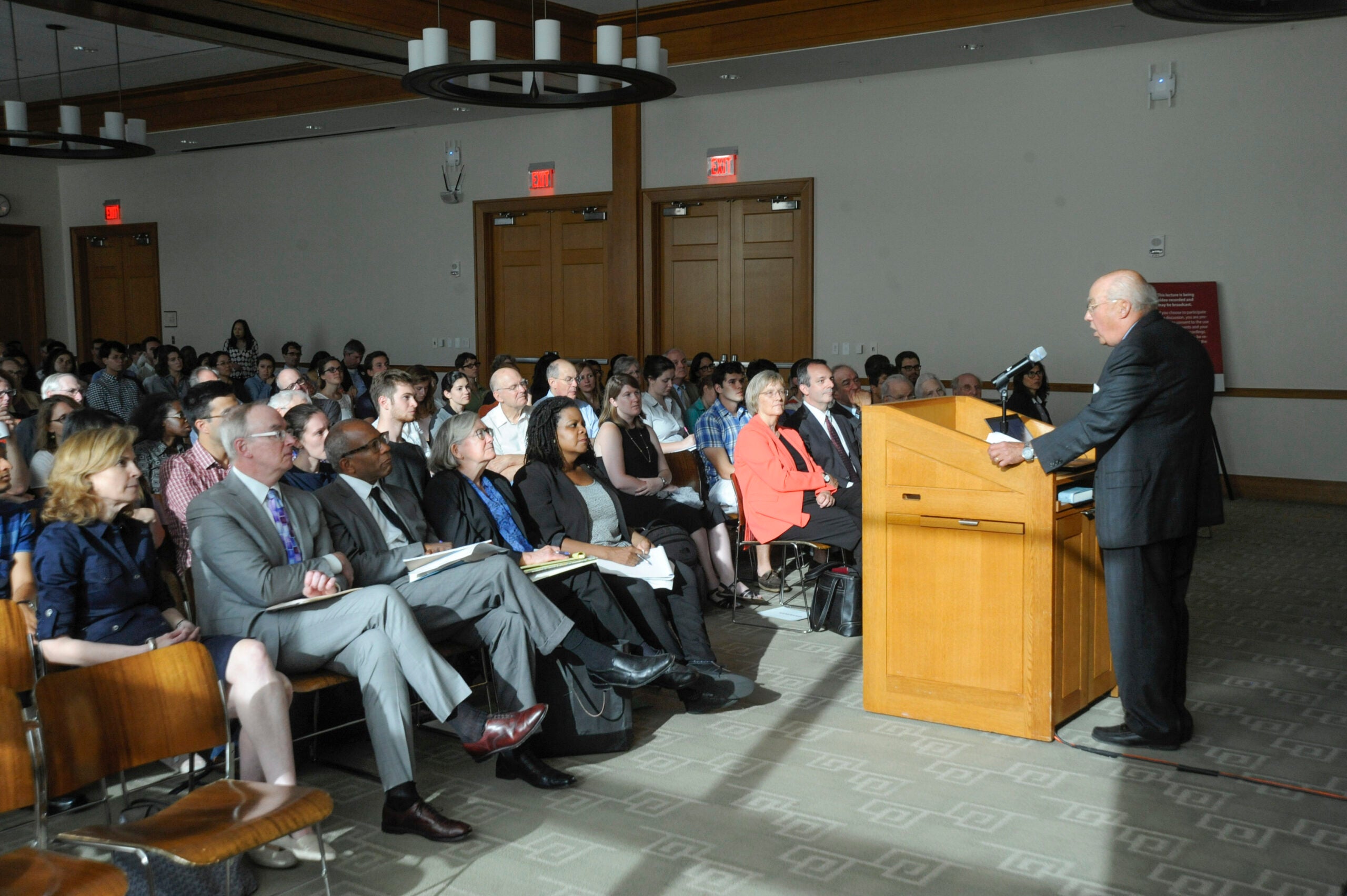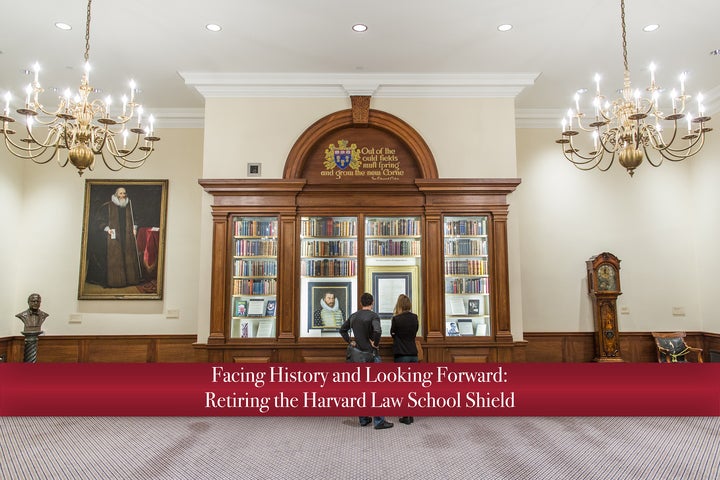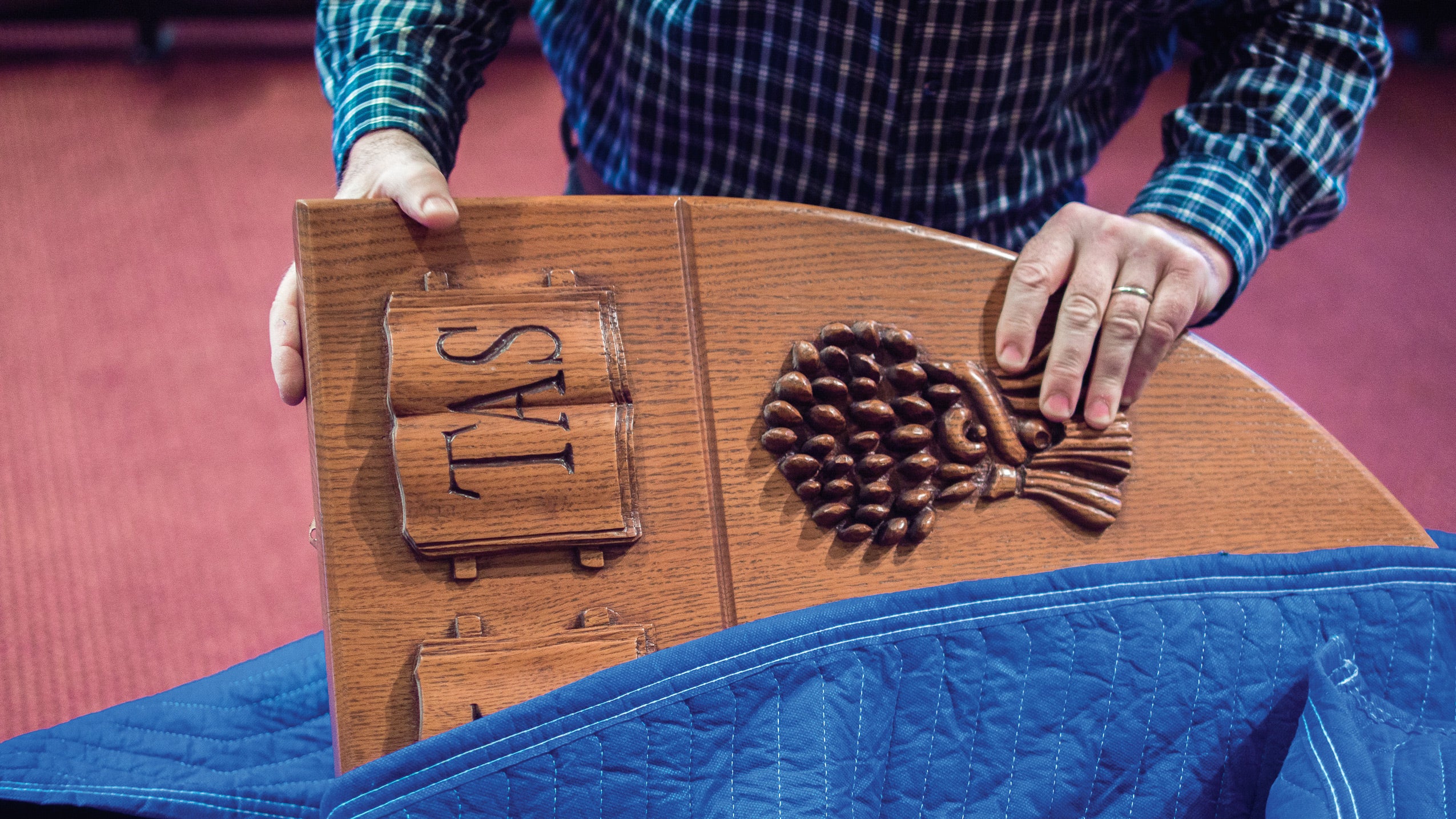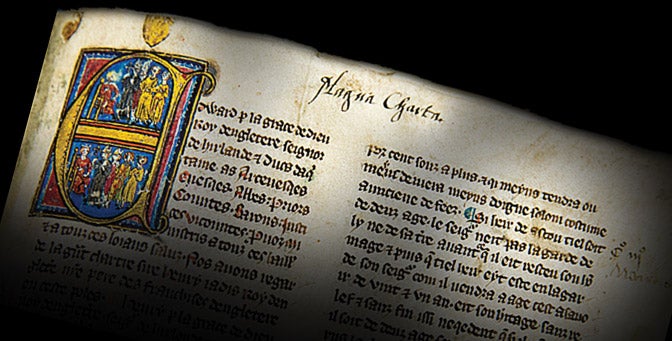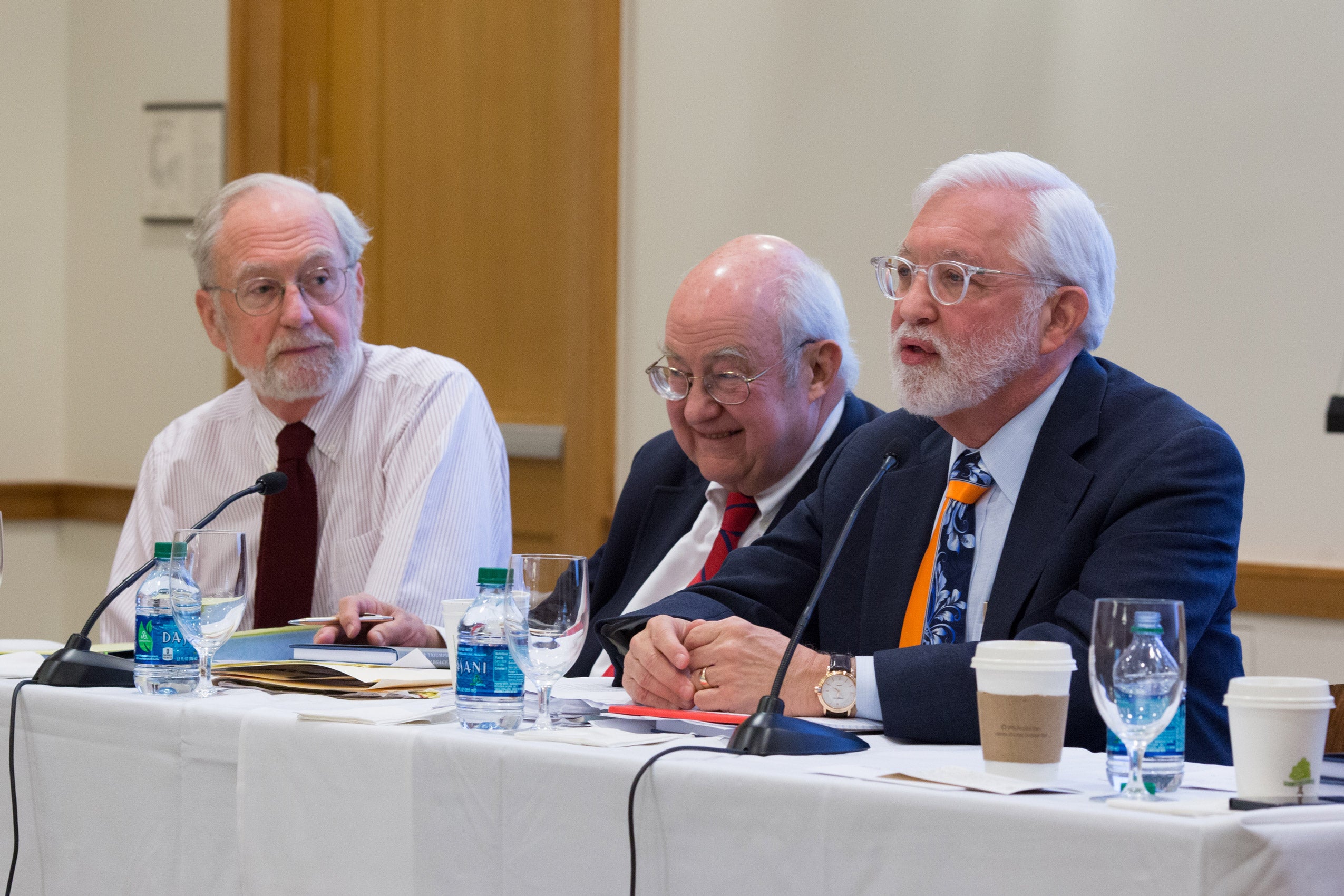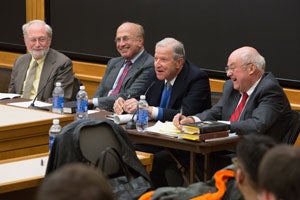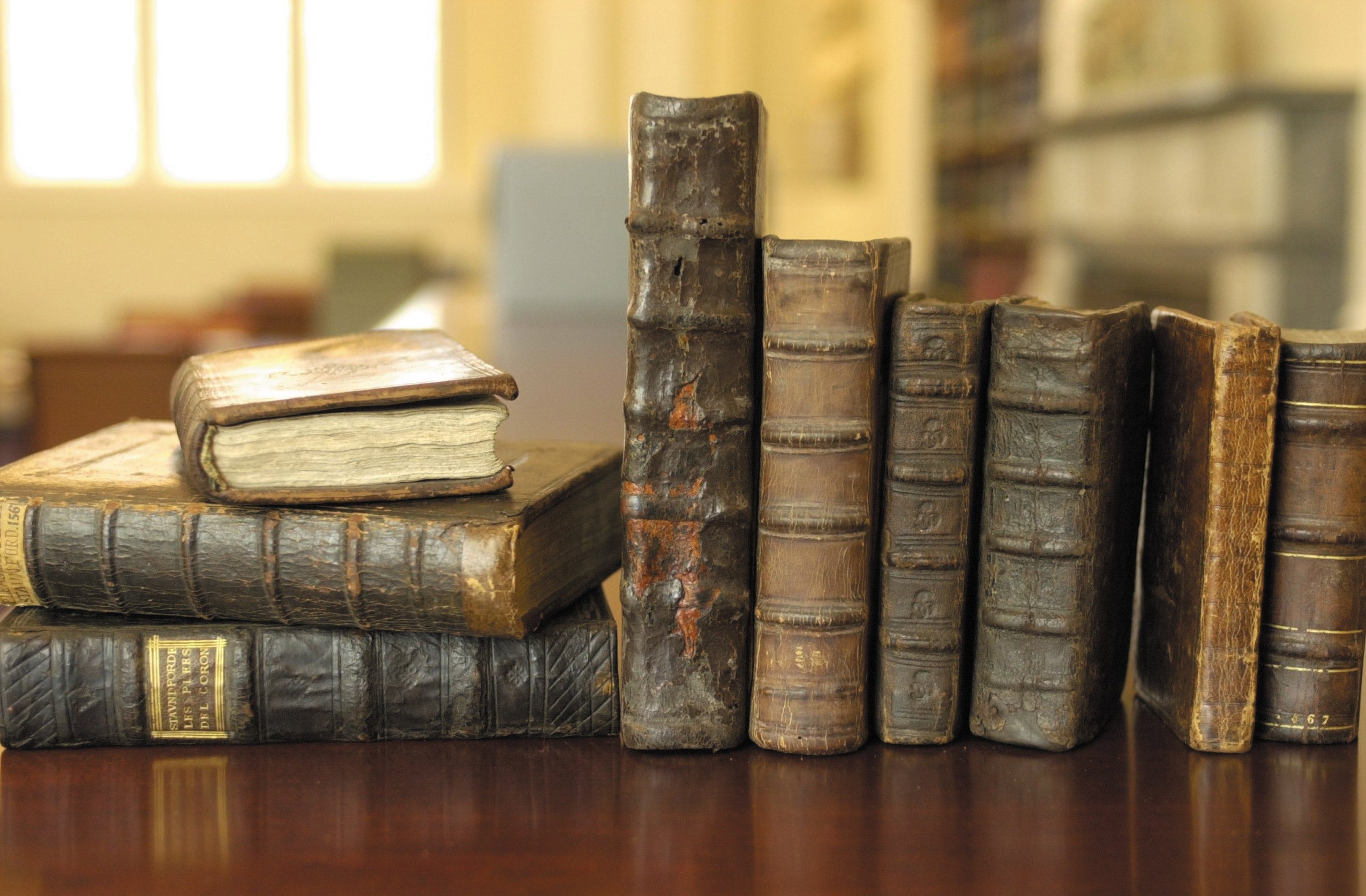People
Daniel Coquillette
-
A Question of History
May 10, 2016
On March 14, the Harvard Corporation voted to retire the Harvard Law School shield, following the recommendation of an HLS committee. The shield is modeled on the family crest of Isaac Royall, whose bequest endowed the first professorship of law at Harvard. Royall was the son of an Antiguan slaveholder.
-
Royall Descendant Cautions Against Forgetting History
March 24, 2016
Controversy erupted this year over Harvard Law School’s seal, which featured the crest of the once-slaveholding Royall family. But long before the current firestorm, the story of Isaac Royall, Jr. quietly lived on in his former Massachusetts house—now a museum—and his surviving descendants, who caution against forgetting the family's history...A descendant of Isaac Royall, Jr.’s, eight generations later, grew up with the story of his contribution to Harvard, and knew about the crest’s link to her family and its slaves before [Daniel] Coquillette unearthed that information. Sixty-five-year-old global health consultant Julia Royall, who now lives in Seattle, recalled learning her family history as a child. She said that preserving this history was important to her relatives,
-
As a Harvard Law School committee was issuing its recommendation March 3 to do away with the institution’s controversial seal, the man who helped bring the issue to light was preparing to give a lecture -- appropriately enough -- on inflammatory symbols of the past. “How’s that for a coincidence?” asked Daniel Coquillette. A former dean of the Boston College Law School and current Charles Warren Visiting Professor of American Legal History at Harvard Law School, the bespectacled Coquillette might not be the most public force behind the recent movement to examine the school’s racial climate. But as co-author of the 2015 book, “On the Battlefield of Merit: Harvard Law School, The First Century” -- which outlines the often unflattering racial history of the prestigious institution -- he has been widely credited with helping to jump-start it.
-
Looking Backward
January 22, 2016
This history of Harvard Law School in its first century (1817-1917) appears at a time when several American colleges and universities are revisiting, and in some instances seeking to revise, their pasts. The revisionist impulses originate in a perceived dissonance between values currently endorsed by members of the educational institutions and the actions or attitudes of some of their prominent alumni or benefactors..But a challenge for those seeking to do serious historical scholarship remains: the need to understand the conduct of past actors before judging them by contemporary standards. When the scholarship is directed at the most visible law school in America, that challenge is accentuated. Daniel Coquillette and Bruce Kimball begin by noting that previous attempts to write the history of Harvard Law School have fallen into two categories: celebratory efforts glossing the school's accomplishments and minimizing its failures, and "attack histories" maintaining that the school's late-20th-century prominence was accompanied by the faculty's and administration's callous attitude toward students. Both sets of prior institutional histories, they conclude, "lack context and tend to be partisan, one way or the other."
-
Harvard Law will scrutinize use of slaveholders’ seal
December 2, 2015
It has long appeared in nearly every corner of the prestigious school. But now Harvard Law School’s official seal is under heavy scrutiny because it includes elements drawn from a slaveholding family’s crest. Following an outcry from students, officials from the school are examining the continued use of the seal, in what is the latest controversy over race and historic injustices on US college campuses in recent weeks. “Symbols are important,” Martha Minow, dean of the law school, said this week. “They become even more important when people care about them and focus on them.”
-
Student group opposes Harvard Law seal, citing slavery ties
November 11, 2015
Some students at Harvard Law School want it to change its official seal, citing its ties to an 18th-century slaveholder...Third-year law student Brian Klosterboer, who's behind the movement, said the crest is a "reminder of this vicious family." "People say we should remember the history, but I think a lot of people don't even know about it," Klosterboer said...Royall was a brutal slaveholder who was known for killing slaves, burning at least one at the stake, said Dan Coquillette, a visiting professor at Harvard's law school. Royall moved to Massachusetts after operating a plantation with hundreds of slaves in the West Indies, Coquillette said. Still, Coquillette, who explored Royall's history in a recent book, said he doesn't think the school should erase that history...Another third-year law student opposing the seal, Alexander Clayborne, said the effort is only the first part of a broader examination of the law school. "Our larger goals include decolonization of the law school in general," he said, "and decolonization of the law school curriculum."
-
The crest of Harvard Law School displays three sheaves of wheat, arranged on a shield. The design is also the coat-of-arms for Isaac Royall Jr., who through his estate helped found the school. Another part of Royall’s legacy, however, is that he was a slaveholder...“These symbols set the tone for the rest of the school and the fact that we hold up the Harvard crest as something to be proud of when it represents something so ugly is a profound disappointment and should be a source of shame for the whole school,” law student Alexander J. Clayborne [`16] told the newspaper. In an interview with The Washington Post, Clayborne said the effort, called Royall Must Fall, came about because some people on campus were looking for ways to support those in South Africa who were calling for the removal of a statue commemorating Cecil Rhodes...[Daniel] Coquillette told The Post he felt it was important to understand the history of the institution, including Royall’s background. He’s a historian, he said, and believes in telling the truth about the past. Coquillette doesn’t think changing the seal is the best approach, he said, but he also doesn’t think conversations about Royall should stop.
-
Some students at Harvard Law School are demanding that the institution’s official seal be scrubbed of references to the slaveholder credited with its founding. The seal of the prestigious law school displays three sheaves of wheat, depicting the family crest of plantation owner Isaac Royall Jr., who bequeathed land to Harvard that funded a professorship in law and led to the school’s founding in 1817...The school, which adopted the seal in 1936, has long wrestled with how to handle its history. Harvard professor Janet Halley, a family law scholar who occupies the Royall Chair of Law, delved into the history in remarks she gave in 2006 at the time of her appointment, citing research by her colleague, Daniel R. Coquillette...“As the holder of the Royall Chair, I think it’s extremely important that we own the Royall legacy,” she said. “We ought to be responsible bearers of this legacy, and that means knowing about it first,” Ms. Halley told Law Blog. Mr. Coquillette, a legal historian who co-wrote a new book examining the school’s early history, agreed with her. “I understand why the students are upset, but this is just a fact of the school,” he said. “If we started renaming things and taking down monuments of people linked to slavery, you would start with Washington. You don’t want to hide your history. A great institution can tell the truth about itself.”
-
At Harvard Law School, Students Call for Change of Seal
November 2, 2015
A new student movement at Harvard Law School is organizing to change the seal at the school, which the students argue represents and endorses a slaveholding legacy. The seal is the coat of arms of the family of Isaac Royall Jr., a slaveholder who endowed the first professorship of law at Harvard. Dubbed “Royall Must Fall,” the movement styles itself after a student activist movement in South Africa that lobbied to remove imagery of Cecil Rhodes, a British imperialist, from the University of Cape Town’s campus. At Harvard, activists formally began their effort for change with a rally of about 25 people on the Law School campus on Oct. 23. They have launched a Facebook page and are now in the process of further organizing. They are drafting a letter to send to the Dean of the Law School Martha L. Minow with their positions, according to Mawuse H. Vormawor, a Law School student and organizer of the effort...Vormawor pointed to the research and scholarship of visiting Law School professor Daniel R. Coquillette, who recently published a book about the first century of Harvard Law School, as inspiration for the movement. In the book, Coquillette details the relationship between the Royall family’s slaveholding and the endowment of the Law School.
-
Too big to fail or too hard to remember? The triumph, tragedy, and lost legacy of James M. Landis ’24
January 21, 2015
On Nov. 24, the Edmond J. Safra Center for Ethics at Harvard hosted “Too Big to Fail or Too Hard to Remember: Lessons from the New Deal and the Triumph, Tragedy, and Lost Legacy of James M. Landis,” a discussion of the legacy of scholar, administrator, advocate and political adviser known for his seminal contribution to the creation of the modern system of market regulation in the United States.
-
A conversation on the legal legacy of Judge Henry Friendly (video)
November 26, 2012
On Wednesday, Nov. 14, a panel of distinguished judges and professors gathered with author David Dorsen '59 to discuss and celebrate his recent biography, entitled “Henry Friendly: Greatest Judge of His Era.”
-
Talking About a Revolution
January 1, 2011
Daniel Coquillette ’71, the Charles Warren Visiting Professor of American Legal History at Harvard Law School and the J. Donald Monan, S.J. University Professor at Boston College Law School, is writing a new history of HLS, to be published in time for the school’s bicentennial—2017. This fall, he gave students an introduction, highlighting ways the school has transformed legal education, but also covering “the rough times and great challenges.” Here are some highlights from his talk, in quiz format.
-
Surviving a journey of centuries, about 1,000 volumes of rare English law books spanning 400 years of legal writing were delivered to Langdell Library this…
